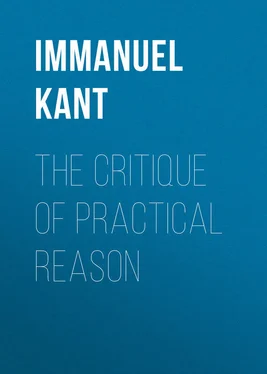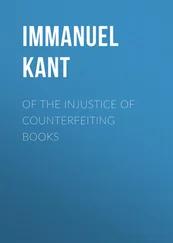Immanuel Kant - The Critique of Practical Reason
Здесь есть возможность читать онлайн «Immanuel Kant - The Critique of Practical Reason» — ознакомительный отрывок электронной книги совершенно бесплатно, а после прочтения отрывка купить полную версию. В некоторых случаях можно слушать аудио, скачать через торрент в формате fb2 и присутствует краткое содержание. Жанр: Философия, foreign_antique, foreign_prose, на английском языке. Описание произведения, (предисловие) а так же отзывы посетителей доступны на портале библиотеки ЛибКат.
- Название:The Critique of Practical Reason
- Автор:
- Жанр:
- Год:неизвестен
- ISBN:нет данных
- Рейтинг книги:5 / 5. Голосов: 1
-
Избранное:Добавить в избранное
- Отзывы:
-
Ваша оценка:
- 100
- 1
- 2
- 3
- 4
- 5
The Critique of Practical Reason: краткое содержание, описание и аннотация
Предлагаем к чтению аннотацию, описание, краткое содержание или предисловие (зависит от того, что написал сам автор книги «The Critique of Practical Reason»). Если вы не нашли необходимую информацию о книге — напишите в комментариях, мы постараемся отыскать её.
The Critique of Practical Reason — читать онлайн ознакомительный отрывок
Ниже представлен текст книги, разбитый по страницам. Система сохранения места последней прочитанной страницы, позволяет с удобством читать онлайн бесплатно книгу «The Critique of Practical Reason», без необходимости каждый раз заново искать на чём Вы остановились. Поставьте закладку, и сможете в любой момент перейти на страницу, на которой закончили чтение.
Интервал:
Закладка:
{PREFACE ^paragraph 10}
By this also I can understand why the most considerable objections which I have as yet met with against the Critique turn about these two points, namely, on the one side, the objective reality of the categories as applied to noumena, which is in the theoretical department of knowledge denied, in the practical affirmed; and on the other side, the paradoxical demand to regard oneself qua subject of freedom as a noumenon, and at the same time from the point of view of physical nature as a phenomenon in one's own empirical consciousness; for as long as one has formed no definite notions of morality and freedom, one could not conjecture on the one side what was intended to be the noumenon, the basis of the alleged phenomenon, and on the other side it seemed doubtful whether it was at all possible to form any notion of it, seeing that we had previously assigned all the notions of the pure understanding in its theoretical use exclusively to phenomena. Nothing but a detailed criticism of the practical reason can remove all this misapprehension and set in a clear light the consistency which constitutes its greatest merit.
So much by way of justification of the proceeding by which, in this work, the notions and principles of pure speculative reason which have already undergone their special critical examination are, now and then, again subjected to examination. This would not in other cases be in accordance with the systematic process by which a science is established, since matters which have been decided ought only to be cited and not again discussed. In this case, however, it was not only allowable but necessary, because reason is here considered in transition to a different use of these concepts from what it had made of them before. Such a transition necessitates a comparison of the old and the new usage, in order to distinguish well the new path from the old one and, at the same time, to allow their connection to be observed. Accordingly considerations of this kind, including those which are once more directed to the concept of freedom in the practical use of the pure reason, must not be regarded as an interpolation serving only to fill up the gaps in the critical system of speculative reason (for this is for its own purpose complete), or like the props and buttresses which in a hastily constructed building are often added afterwards; but as true members which make the connexion of the system plain, and show us concepts, here presented as real, which there could only be presented problematically. This remark applies especially to the concept of freedom, respecting which one cannot but observe with surprise that so many boast of being able to understand it quite well and to explain its possibility, while they regard it only psychologically, whereas if they had studied it in a transcendental point of view, they must have recognized that it is not only indispensable as a problematical concept, in the complete use of speculative reason, but also quite incomprehensible; and if they afterwards came to consider its practical use, they must needs have come to the very mode of determining the principles of this, to which they are now so loth to assent. The concept of freedom is the stone of stumbling for all empiricists, but at the same time the key to the loftiest practical principles for critical moralists, who perceive by its means that they must necessarily proceed by a rational method. For this reason I beg the reader not to pass lightly over what is said of this concept at the end of the Analytic.
I must leave it to those who are acquainted with works of this kind to judge whether such a system as that of the practical reason, which is here developed from the critical examination of it, has cost much or little trouble, especially in seeking not to miss the true point of view from which the whole can be rightly sketched. It presupposes, indeed, the Fundamental Principles of the Metaphysic of Morals, but only in so far as this gives a preliminary acquaintance with the principle of duty, and assigns and justifies a definite formula thereof; in other respects it is independent. 3 3 A reviewer who wanted to find some fault with this work has hit the truth better, perhaps, than he thought, when he says that no new principle of morality is set forth in it, but only a new formula. But who would think of introducing a new principle of all morality and making himself as it were the first discoverer of it, just as if all the world before him were ignorant what duty was or had been in thorough-going error? But whoever knows of what importance to a mathematician a formula is, which defines accurately what is to be done to work a problem, will not think that a formula is insignificant and useless which does the same for all duty in general.
It results from the nature of this practical faculty itself that the complete classification of all practical sciences cannot be added, as in the critique of the speculative reason. For it is not possible to define duties specially, as human duties, with a view to their classification, until the subject of this definition (viz., man) is known according to his actual nature, at least so far as is necessary with respect to duty; this, however, does not belong to a critical examination of the practical reason, the business of which is only to assign in a complete manner the principles of its possibility, extent, and limits, without special reference to human nature. The classification then belongs to the system of science, not to the system of criticism.
{PREFACE ^paragraph 15}
In the second part of the Analytic I have given, as I trust, a sufficient answer to the objection of a truth-loving and acute critic 4 4 [See Kant's "Das mag in der Theoric ricktig seyn," etc. Werke, vol. vii, p. 182.]
of the Fundamental Principles of the Metaphysic of Morals- a critic always worthy of respect- the objection, namely, that the notion of good was not established before the moral principle, as he thinks it ought to have been. 5 5 (2) It might also have been objected to me that I have not first defined the notion of the faculty of desire, or of the feeling of Pleasure, although this reproach would be unfair, because this definition might reasonably be presupposed as given in psychology. However, the definition there given might be such as to found the determination of the faculty of desire on the feeling of pleasure (as is commonly done), and thus the supreme principle of practical philosophy would be necessarily made empirical, which, however, remains to be proved and in this critique is altogether refuted. It will, therefore, give this definition here in such a manner as it ought to be given, in order to leave this contested point open at the beginning, as it should be. LIFE is the faculty a being has of acting according to laws of the faculty of desire. The faculty of DESIRE is the being's faculty of becoming by means of its ideas the cause of the actual existence of the objects of these ideas. PLEASURE is the idea of the agreement of the object, or the action with the subjective conditions of life, i.e., with the faculty of causality of an idea in respect of the actuality of its object (or with the determination of the forces of the subject to action which produces it). I have no further need for the purposes of this critique of notions borrowed from psychology; the critique itself supplies the rest. It is easily seen that the question whether the faculty of desire is always based on pleasure, or whether under certain conditions pleasure only follows the determination of desire, is by this definition left undecided, for it is composed only of terms belonging to the pure understanding, i.e., of categories which contain nothing empirical. Such precaution is very desirable in all philosophy and yet is often neglected; namely, not to prejudge questions by adventuring definitions before the notion has been completely analysed, which is often very late. It may be observed through the whole course of the critical philosophy (of the theoretical as well as the practical reason) that frequent opportunity offers of supplying defects in the old dogmatic method of philosophy, and of correcting errors which are not observed until we make such rational use of these notions viewing them as a whole.
(2) I have also had regard to many of the objections which have reached me from men who show that they have at heart the discovery of the truth, and I shall continue to do so (for those who have only their old system before their eyes, and who have already settled what is to be approved or disapproved, do not desire any explanation which might stand in the way of their own private opinion.)
Интервал:
Закладка:
Похожие книги на «The Critique of Practical Reason»
Представляем Вашему вниманию похожие книги на «The Critique of Practical Reason» списком для выбора. Мы отобрали схожую по названию и смыслу литературу в надежде предоставить читателям больше вариантов отыскать новые, интересные, ещё непрочитанные произведения.
Обсуждение, отзывы о книге «The Critique of Practical Reason» и просто собственные мнения читателей. Оставьте ваши комментарии, напишите, что Вы думаете о произведении, его смысле или главных героях. Укажите что конкретно понравилось, а что нет, и почему Вы так считаете.












